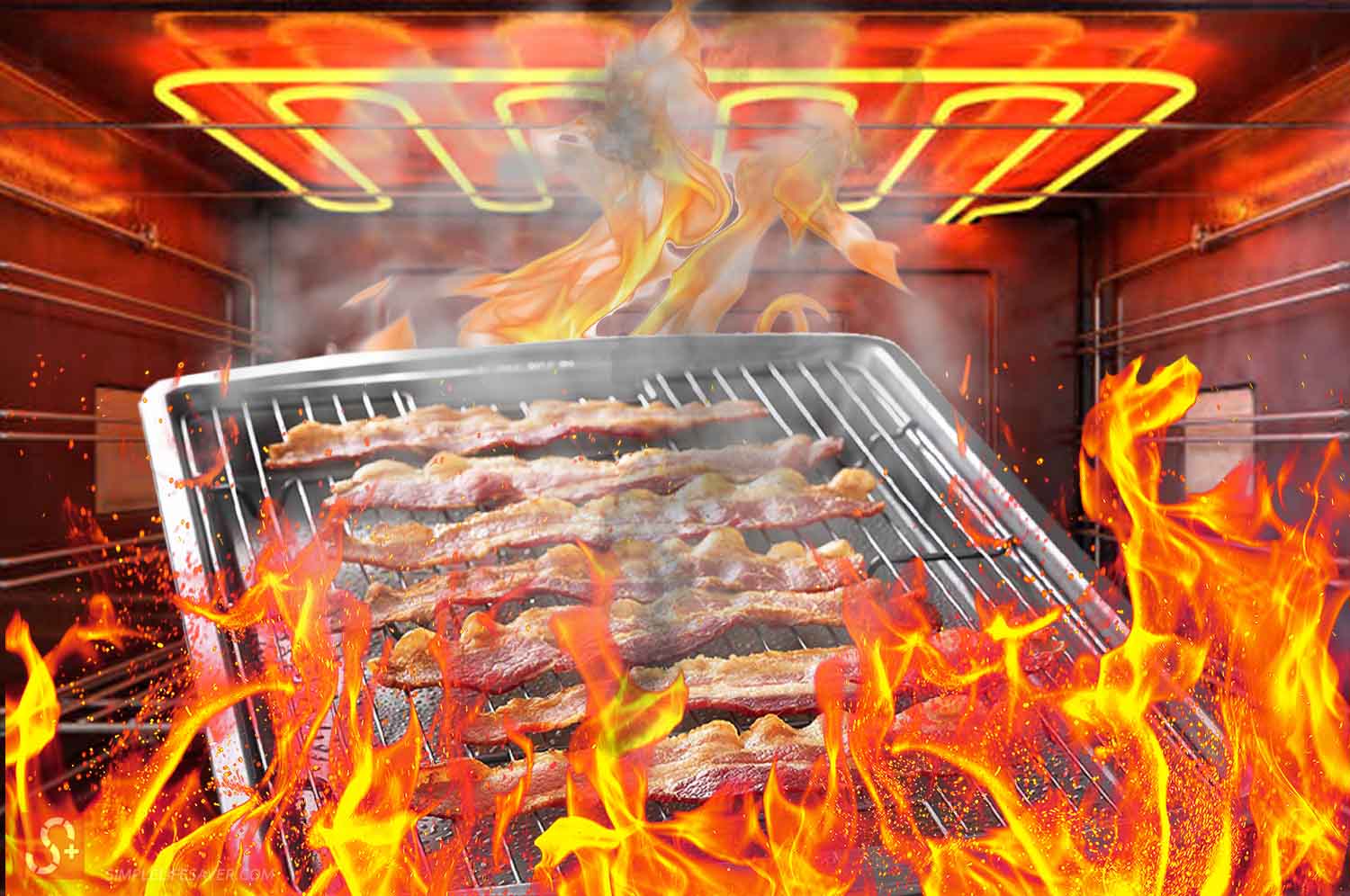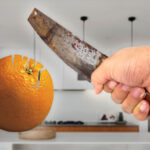Bacon is one of the most popular and delicious foods, and many people enjoy preparing it at home. But could the grease from the bacon actually be dangerous?
Bacon grease could potentially cause a fire in your oven. It has a smoke point of 450°F (232°C) and can ignite at 500°F (260°C), so fires are possible. However, it’s more likely to catch fire if grease build-up, food, or foil pieces are already in your oven.
This article will further explain how bacon grease in an oven can potentially start a fire and if it can melt the plastic. We’ll also discuss the temperature at which bacon grease catches fire and how to prevent it from building up in your oven.
What Temperature Does Bacon Grease Catch Fire?
Understanding the temperature at which bacon grease catches fire is essential to preventing oven fires.
When oils reach excess temperatures, they break down into free fatty acids and form acrolein, the chemical responsible for the burned and bitter flavor in hot oil.
As the free fatty acids break down, they start to smoke, known as the smoke point. If the oil or grease is heated further, it will ignite. The size of the fire will depend on the amount of bacon grease.
Bacon grease can catch fire at 500°F (260°C) and has a smoke point of 450°F (232°C). If you notice your bacon grease starting to smoke, this is a red flag and could result in an oven fire, so be very careful if you notice your bacon grease smoking.
It’s advisable to remove your bacon from the oven as soon as it’s been cooked. This will help prevent the grease from reaching the smoke point and causing a fire.
Chances of Bacon Grease Catching Fire in an Oven
Avoiding a home fire is always advisable, and it’s imperative to prevent a grease fire as these are more difficult to extinguish.
Grease fires can’t be extinguished with water and, if you don’t have a fire extinguisher, you’d need to wait for the fire department to assist.
The chances of bacon grease starting a fire in your oven are increased if one of the following is true for you:
- Your oven contains grease spots, food pieces, torn baking paper, aluminum foil, etc. If you notice any of these things in your oven, remove them or clean them as soon as possible as they can easily catch fire when the oven is hot enough.
- You don’t clean your oven regularly. Regular oven cleaning is hygienic and more pleasant for cooking, but it also removes grease from the inner walls. When hot enough, grease spots or layers can catch fire.
- You prepare your bacon using too much oil. Oil can make bacon crispier and tastier, but you don’t need to use any oil when making bacon. Not using oil for bacon preparation can also help to prevent an oven fire since oil is fire fuel.
- You use too much baking paper or aluminum foil when cooking bacon. If you cook bacon on baking paper or foil, try not to use so much that it extends over the pan edges as this can cause an oven fire.
- You often forget to turn your oven off. When your bacon is ready to eat, it can be tempting to do so right away but remember to turn your oven off first! If your oven has a grease build-up and reaches an extremely high temperature, these are perfect conditions for a fire.
How To Prevent Bacon Grease From Accumulating in Your Oven
Now that we’ve seen the conditions under which bacon grease in an oven will start a fire, we can look at ways to prevent bacon grease build-up.
Below are some interesting considerations:
- Use an air fryer or Dutch oven for cooking bacon. Air fryers and Dutch ovens are much smaller than regular ovens and far easier to clean. They also cook bacon similarly to an oven but often do so quickly and use less electricity.
- Cook bacon on the stovetop and use a splatter guard. If you’re worried about grease splattering all over your oven walls and you’d like to prevent an oven fire, consider preparing your bacon on the stovetop instead.
To protect yourself and your kitchen from grease splats, invest in a splatter guard to place over the pan. You can buy a splatter guard from most big box and home stores.
- Line a rimmed baking tray with foil and baking paper. When cooking bacon in an oven, most of the grease falls downward and into the cooking receptacle.
- To clean up easier and prevent accidental grease spills, cook your bacon in a rimmed baking tray. This will ensure that most of the bacon grease remains in the baking tray.
- For an even easier cleaning-up experience, line your baking tray with foil with baking paper on top. The grease will collect in the foil, and you may not even have to clean the tray at all.
- Lay the bacon flat. Laying your bacon flat on the baking tray prevents grease splatter and helps to cook it evenly.
- Invest in a baking or pizza screen. If your favorite bacon cooking method is in the oven, a baking or pizza screen can help prevent the grease from splattering. You can buy these at most stores that sell cooking implements. Splatter guards should not be placed in an oven as the handles can melt.
- Place aluminum foil on the bottom of your oven. Oven cleaning is a tedious and time-consuming job. To avoid cleaning your oven more often than you need to, line the bottom with aluminum foil.
Although this won’t prevent the grease from landing on the sides or roof of the oven, it protects the bottom, which is where most bacon grease accumulates. You can replace the aluminum foil whenever needed.
Will Bacon Grease Melt Plastic?
Many people save bacon grease for use in other dishes, such as sauteed vegetables, gravies, and cornbread.
If you enjoy saving bacon grease for recipes or you’d like to collect fresh bacon grease from your oven, it’s best not to use a plastic container. A metal or glass container is better suited to hot bacon grease as these materials have much higher melting points.
Hot bacon grease can melt the plastic. Bacon grease reaches temperatures of between 350°F (177°C) and 400°F (204°C), and most plastic will melt at 212°F (100°C). However, the precise melting rate of plastic depends on the type of plastic. PVC melts at a lower temperature than HDPE and polypropylene.
Bacon grease solidifies at 80°F (26.7°C), so if the only container you have is plastic, use a thermometer and pour the grease in when it is just above this temperature.
Final Thoughts
Bacon grease can start a fire in your oven if it has exceeded the smoke point of 450°F (232°C). Most bacon grease ignites at 500°F (260°C), and the size of the fire will depend on the amount of bacon grease.
The chances of an oven fire are increased if you already have a grease build-up in your oven, you often forget to turn your oven off, or if it contains old food or foil pieces.
Since the temperature of bacon grease is between 350°F (177°C) and 400°F (204°C) and plastic melts at 212°F (100°C), it can also melt the plastic.








